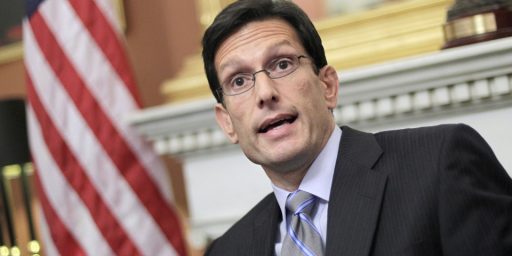Stupidly, House GOP Appears To Take Taxes Off The Table In Future Budget Talks
The GOP seems to be telling President Obama that revenue increases are off the table. That's a huge mistake.
Speaker John Boehner seemed to warn President Obama that any budget reform proposal that includes tax increases won’t go anywhere:
Do House Republican leaders want to put taxes on the table as they try to tackle the deficit?
House Speaker John Boehner (R-Ohio) and House Majority Leader Eric Cantor (R-Va.) had been staking out slightly different stances on whether tax increases should be a part of the discussion on entitlement reform, with Boehner leaving a small window and Cantor taking a hard line.
When asked by George Stephanopoulos on ABC last week, Boehner said, “I’ll put everything on the table.”
“I think Washington has a spending problem,” Boehner said. “I don’t think it has a revenue problem. I’m not interested in raising taxes on the American people. But if— if it— if it takes leaving it on the table to have the conversation, I’ll have the conversation. It’s time to deal with these challenges.”
But on Tuesday Boehner seemed to firm up his stance in advance of President Barack Obama’s speech on the deficit at George Washington University Wednesday, calling tax increases a non-starter.
“(I)f the President begins the discussion by saying we must increase taxes on the American people – as his budget does – my response will be clear: tax increases are unacceptable and are a nonstarter,” Boehner said in a statement. “We don’t have deficits because Americans are taxed too little, we have deficits because Washington spends too much. And, at a time when the American people face skyrocketing prices at the pump, energy tax hikes are a particularly bad idea.”
Boehner’s tough line was echoed by Majority Leader Eric Cantor:
“If you believe you can raise taxes and that doesn’t have consequences on people and entities that we’re relying on to grow the economy, then your question and the implication of your question would hold true,” Cantor said, responding to a question about revenues being at a multi-decade low. “What we believe is we gotta grow this economy, that’s how you increase revenues as a percentage of GDP. And there needs to be an all-out effort to understand how we’re going to do that. We believe strongly you do that by creating an environment for the private sector to put capital at risk and to grow. You don’t sit here and just operate from one side, which is the government ledger and say we just need to fill that because it’s fictional.”
Rhetoric like this certainly will resonate well with the base, but I’ve got to wonder if it makes sense in the long term. I’m no fan of increasing taxes on anyone, but I cannot see how a comprehensive deal to fix the budget mess in Washington can be done without tax increases, or the broader subject of tax reform, being on the table. Moreover, there are a host of good economic reasons to sit down and talk about simplifying the Internal Revenue Code, which costs individuals and businesses huge amounts of money in compliance costs every years. There are plenty of loopholes to close, plenty of sweetheart tax credits that should be examined, and plenty of supposedly sacrosanct deductions (like the home mortgage interest deduction) that make no economic sense. We could simplify the tax code, not touch the marginal rates, and in all likelihood we’d end up with increased government revenues.
Bruce Bartlett, a former policy adviser for Ronald Reagan who has become somewhat anathema on the right for his refusal to follow the “no new taxes” orthodoxy wrote about this a few weeks ago:
The idea that deficits don’t matter, that only spending matters, and that one can’t be a Republican and support even the most innocuous tax increase is a recent historical development. Ronald Reagan often supported large tax increases both as governor of California and as president. By the end of his presidency, he signed into law legislation that raised revenues by $133 billion ($370 billion today).
Nor is the idea that the American people oppose tax increases as politically popular as Republicans seem to believe. The latest ABC News/Washington Post poll found that 64 percent of people favor tax increases as part of a deficit reduction deal. And 71 percent think Republicans have not done enough to reduce the deficit by refusing to compromise.
The opposition of one Republican organization to any form of tax increase no matter how big the deficit gets wouldn’t matter much if it weren’t for the Tea Party, which takes its marching orders on taxes from Norquist. And there is not a single Republican in Congress who isn’t frightened to death of a Tea Party challenger in the Republican primary next year. They know from the experience in 2010 that no incumbent Republican is safe, no matter how conservative their voting record, if they don’t kowtow sufficiently to the Tea Party. They also know that Tea Partiers would rather lose a seat to the Democrats than make the tiniest concession to their ideological dogma on hot-button issues such as health or taxes.
This reality has effectively given Norquist veto-power within the GOP on all tax issues. Like an ancient Roman emperor turning thumbs-up or thumbs-down in deciding whether a gladiator would live or die, he alone decides what is a violation of the tax pledge and what isn’t. And woe be to the Republican who gets Norquist’s thumbs-down because he or she is likely to suffer political death at the hands of the Tea Party.
As Bartlett goes on to note, there are some Senators, including Republican deficit hawks like Tom Coburn who are pushing the idea of comprehensive tax reform as part of an overall deficit reduction package:
The Senate group’s working plan calls for placing separate caps on security and nonsecurity spending, and missing a budget target in one area would not trigger mandatory cuts in the other. The spending targets would follow proposals laid out by the deficit commission, which recommended cutting discretionary spending by $1.7 trillion through 2020. Lawmakers on the spending committees would draft legislation to meet the targets. But if they were not met, automatic, across-the-board cuts would go into effect.
The tax-writing committees would be given two years to overhaul both the individual and corporate tax codes, with general instructions to close tax breaks and minimize or eliminate tax deductions while lowering tax rates. The committees would be given a target for additional revenues to be raised by the new code. The deficit commission’s version of tax reform would net $785 billion in additional revenues over 10 years.
If Congress failed to enact the tax code overhaul, the legislation would mandate an across-the-board tightening of tax deductions to meet the higher target.
These are the kind of ideas that Washington ought to be talking about. Instead, we’re getting the Democrats saying the GOP wants to starve the elderly, and Republicans repeating George H.W. Bush’s tired “No New Taxes” mantra from 23 years ago. It’s getting quite tiresome.







Well, ever since the Reagan era, the standard Republican solution to any problem – terrorism, the Soviet Union, Iraq, unemployment, anything – has been one chanted refrain:
Give more money to rich people.
There is nothing that cannot be “solved” by this simple policy. Except not being rich.
No republican (or moderate democrat) who wants a chance at reelection will ever hint that they would allow a tax increase.
Reforming the tax system is definitely on the table.
So, republicans and moderate democrats aren’t for cutting spending. Awesome.
Tiresome.
I hope that was tongue-in-cheek, jwest. That is, that one can “reform” taxes to higher revenues.
BTW, Megan McArdle wrote:
Unless you think government spending should rightly zoom past the historical 18.5% to the 24% or higher that we are now, why should more taxes be on the table? Speaker Boehner is right about one thing at least, we don’t have a revenue problem, we have a spending problem and raising taxes will do absolutely nothing to fix that. In fact, it will probably make it worse.
Oh, and we’ve been down the “let’s raise taxes and cut spending jointly” road before, kind of like we’ve been down the “amnesty is a one time only deal” road before. Let’s be nice and just say that talk is cheap.
One last cheap shot. Speaker Boehner tried to deflect criticism of the budget deal by noting that House Republicans only control one-half of one-third of the government. Ok, so what’s one-half of one-third of $1.5T in deficit spending this year? Here’s a hint, it’s a lot more than $38B, as though the $38B was even an honest number.
legion, any idea how many “rich” people today weren’t “rich” 3o years ago? Or is it beyond your ability to grasp that it is important to allow people to create wealth rather than just redistribute it?
Read the McArdle piece, Charles. Another quote:
It’s kinda dumb to assume capitulation.
According to the Wall Street Journal, 81% of Americans support raising taxes on the rich to help balance the budget.
Yes, but the GOP works for 2% of Americans. So they don’t really give a crap about that.
“No republican (or moderate democrat) who wants a chance at reelection will ever hint that they would allow a tax increase.”
That statement reflects political reality. Voting for a tax increase is not even an option. If anyone outside of a totally safe democrat district even hints, jokes or opines that we should “explore the possibility” of a tax increase, they face certain elimination in either the primary or general election.
john personna, I’ve read the McArdle piece. She’d really fit well on the staff of The Economist, if you know what I mean.
ponce, congratulations, you’ve discovered that the populace is suceptible to class warfare propaganda. So, where’s the money come from after you’ve eaten the rich? I’ve long maintained that progressivism seems to be motivated by the projection of envy more than anything else, and you are confirming my thesis.
anjib-san, really, you seem to have gone off the rails. While I didn’t generally agree with you, I could respect your opinion, but this is silly.
Ok Charles, tell you what. Call your congressional rep’s office and tell them you are a business owner and would like a 5 minute meeting with your rep to discuss some of your concerns about the economy. Please get back to me and let me know how that works out for you.
You seem, Charles, to be playing a straw man. Or a false dichotomy.
You seem to think it is a choice between 100% budget cuts and 100% tax increases.
No one sane would suggest that.
(Oh, I guess I could get the mainline Dem position a score of “more rational” because they acknowledge cuts are necessary. They aren’t playing the straw man.)
Should I cut-and-paste a “where is the leadership” shot?
And Charles? If you want to talk about silly, you should probably move beyond cut & pasting Fox talking points.
New rule, you can’t complain about propaganda and then talk about eating the rich in the same paragraph.
Charles,
30 years ago, rich Americans tended to spend their money here, putting it back into the US economy – buying things, building factories, employing American workers. That’s not so much the case anymore. Rich individuals and major corporations take their profits and their jobs out of the US to cheaper countries, where they can make even bigger profits. They buy luxuries not made in America, and – despite GOP propaganda to the contrary – they do not pay their “fair share” in return.
As a somewhat anecdotal example, look at the debt ceiling debate. No matter how distasteful, it’s pretty obvious that not raising it would both a) not do anything to actually solve our deficit issue and b) risk driving the US and global economies even farther into destruction than they were a year ago. But GOP strongmen like Boehner and McConnell are having to beg Wall Street plutocrats and conservative pols to let them raise it. Why? Because those people simply don’t care if the US defaults on its loans. If they make money off the results, they consider it “good”. That’s their only measuring stick.
I could not disagree more with the premise that it is ‘stupid’ for the GOP to take taxes off the table. They should, and then the hard part, and actually stick to it. Washington has a spending problem, period. That is where a true fix starts. There is no ‘taxing problem’. Unfortunately for everyone not in the political class or among their ‘extended family and friends’, the republicans, who are Washington’s designated cut spending/cut taxes/limited government ‘team’, will be no more effective at preventing tax increases than at ‘slashing’ spending. The dust is still settling and the ink yet to dry on the “record spending cuts” and what do we have- probably less than $20 billion of actual cuts out of a record $1.7 trillion budget. This in the same culture where $105 billion ‘sneaks’ into Obamacare and the recent study where several hundred billion $ of waste due to ‘overlap and duplication’ is acknowledged. Only in Washington are spending cuts and tax increases mythically connected at the hip. It is possible to have one without the other. We did not radically reduce taxes in an ‘attempt’ to stimulate the economy. We did however radically increase spending and now increasing taxes is going to fix things?
oricowits, are you representative of that minority that thinks it is a majority?
If the GOP were a country, and not a minority, they might make cuts work. Or not. They actually like their social security and medicare as well.
Anyway, this “off the table” stuff, in context of American democracy is just a spoiler, a barrier to progress.
Oricowits,
The idea that the GOP is the party of ‘cutting spending’ and ‘limited government’ is beyond laughable. That’s another piece of PR that hasn’t been true since before Reagan.
These so-called republicans are fiscal frauds. If you are unwilling to raise revenues an cut defense then you are not serious about deficit reduction.
I have one question…if Ryan’s plan to abolish Medicare is so great why are we going to wait ten years?
Or why can’t we wait 15? 🙂
We do have a revenue problem.
You can find tons of critical information at these government sites:
http://www.usgovernmentrevenue.com/revenue_brief.php
http://www.usgovernmentspending.com/us_20th_century_chart.html
Since 2000 (when we had no financial problems), the following critical changes have occurred:
* Revenue: down 5.6% (From 20.35 to 14.75% GDP)
* Military: up 2.2% (From 3.6 to 5.8% GDP)
* Health: up 2.1% (From 3.5 to 5.6% GDP)
* All other: up 1.3% (From 10.9 to 12.2% GDP)
So half of our budget deficit is due to decreasing revenue. The other half is mostly Defense and Medicare + Medicaid.
legion, 30 years ago, most of the industrialized world was still recovering from the destruction of WWII. The US squandered the lead it had for lots of reasons, but very little to do with not being taxed enough. Maybe having almost the highest corporate tax rate, along with Sarbanes-Oxley, a certifiably nuts Congress and regulatory apparatus that makes long term planning impossible have something to do with all those jobs going overseas. If you are arguing for protectionism, your knowledge of history is extremely suspect. Perhaps you haven’t noticed but crony capitalism has gotten worse under Democrats than it was under Republicans, but I’m happy to throw all the bastards out and start over. Say, where did all that TARP money go? And what’s Peter Orszag, the liar in chief for Obama’s budget projections, up to these days?
john personna, I’m ok with you calling me insane if that works for you, but if you look at any chart of federal revenue and federal spedning over the last 50 years it is absolutely, painfully obvious that we have a spending problem, not a revenue problem. There’s a lot to fix in the tax code and many ways to do it, but just generically saying we aren’t taxed enough isn’t true. Revenue is down a little right now, but nothing extraordinary if we weren’t already running enormous deficit spending just for the day to day expenditures.
anjin-san, without going into specifics, been there, done that. Works better than you may think.
others, I agree that the Republicans are frauds when it comes to controlling spending and limited government. I also believe that the Democrats are worse. Some of you seem to forget that the Tea Party targeted Republicans as much as Democrats.
Small correction, it is fairer to say 50 years ago, because 30 years ago the decline had already begun, and it wasn’t just because of globalization.
Charles… most of the industrialized world was recovering from ww2 damage in 1981? Really?
Step away from the bong…
Slash spending right away. Tax increases? Maybe later.
anjin-san, well, I’m still 12 minutes quicker on the uptake than you.
But is that the limit of your substantive response?
@oricowits
“We did not radically reduce taxes in an ‘attempt’ to stimulate the economy.”
But hasn’t the mantra been, at least since President Reagan, that cutting the marginal rates for the top income folks will, in fact, stimulate the economy? On TV I saw the Speaker make the same (old) claim just yesterday. What other argument for tax cuts — mainly at the top — could one make to justify this? And by “justify”, I mean justify in terms aiding the economy?
Oh, and
@Charles
” Say, where did all that TARP money go?”
It went to your real mortal enemies, the large banks and corporations. But keep looking for the ghost of Stalin under your bed, Charles.
Charles,
I don’t disagree with many of your statements, it’s mostly your conclusions. A high corporate tax rate doesn’t mean much if corporations use the tax laws to dodge actually _paying_ that rate. I’d argue that crony capitalism is, at best, the same under D’s as R’s, but that’s a whole ‘nother argument & one that’s largely irrelevant. Also, it’s hard to accuse Congress of discouraging corporations while simultaneously being cronies of those corporations.
The GOP party line used to be that deficit spending was perfectly fine, because it encouraged growth, and we could grow our way out of the deficit. But that only works if you a) ever stop deficit spending and b) actually achieve any growth from the money you do spend. You seem to be focused on a), and I’m more worried about b).
No Sam , taxes were not ‘radically reduced’ in an attempt to stimulate the economy. Spending was radically increased and has not as yet been pulled back. Whatever the ‘mantra’ might be is moot because that school of thought was not enacted and has zero to do with the current fiscal dilemma. That said, Obama should have allowed the “Bush taxcuts” to expire. These particular tax cuts were poorly targeted and of minimal if any stimulative value. Obama saw the cuts the same way Bush did and most politicans do- wide reaching with a lot of potential political value at a relatively modest cost. As for proposed budgets going forward, there will be no tax cuts, ever. Republicans are politicians first and then tax cutters at some other level so you have nothing to worry about.
” Say, where did all that TARP money go?”
It actually went back to the taxpayers.
Oh, and for those who still can’t get past the “rich” paying their fair share meme, if you raise the income tax rate to 100% on all earnings of those making over $250K a year, I think the sum total of your revenue will be $1.1T. Of course, that also assumes that those “rich” won’t do anything different but be happy to work just as hard and take just as many risks to be slaves for the non-“rich”, but I digress.
Any more suggestions on how to resolve the revenue problem, or is that enough to at least get you to consider that the problem isn’t revenue but spending that is out of whack? Or to at least acknowledge that this level of spending means that 48% of the populace can’t get away with a 0% federal income tax rate?
sam, wtf? And I don’t mean winning the future.
“Or to at least acknowledge that this level of spending means that 48% of the populace can’t get away with a 0% federal income tax rate?”
I for one would not mind seeing the income tax drilled down further. But, really, Charles, those un-income-taxed lucky duckies do, for the most part, pay FICA taxes (among others), which are taxes on income. Then there is this heart-wrenching story of the rape of the rich:
“Of course, that also assumes that those “rich” won’t do anything different but be happy to work just as hard and take just as many risks to be slaves for the non-”rich”, but I digress.”
Your codpiece is slipping.
Well you donks can increase spending until you break the country then we will take up arms and eliminate you. Sounds like a perfectly good plan. It is not the one you progressives envision because you think after you break the system you will be able to offer a solution. Government does everything. Our solution will be to end your turn at government forever. I guess you idiots like Anjin, missed the last election. Acting like the people did not speak will not quiet the voices. In 2012, most of the donk senators will be gone. So will the donk President.
Charles… I have a pretty good shot at breaking 250k in the next two years. You know what I won’t be doing if that happens? Whining about how I am a slave and a victim of wealth envy. I will be far too busy gunning for 350k. Without a stable society, success becomes a lot harder to achieve.
@Wiley Stugatz
“Well you donks can increase spending until you break the country then we will take up arms and eliminate you. Sounds like a perfectly good plan”
Tell me this violence-obsessed moron is not Zels.
You guys asking about TARP should have your eyes on TALF instead.
Matt Taibbi Asks Why The Fed Gave $220 Million In Bailout Money To The Wives Of Two Morgan Stanley “Bigwigs”
And on taxation, the rich, the poor, Felix Salmon recommends this:
9 Things The Rich Don’t Want You To Know About Taxes
I think that one rounds up some good data.
Other than that, this thread is really about the straw man, isn’t it? That any tax increase equals nothing but tax increase? pu-lease.
jp: And not just nothing but tax increases, but Charles upped the ante to 100% tax increases. We should be reaching agreement any minute now. This must be what it’s like to try to reach a budget agreement with a bunch of TPers.
Well, in case anyone is still watching, ahem, I guess jp was exactly addressing Charles’s post, so mine was redundant and superfluous and unnecessary. But I still stand by the idea that that’s what it must be like trying to come up with an agreement with TPers….
Sam : All indications point to Zel…
I don’t care if the wsj polls says 81% of people support raising tax on the “rich”. If half the people in the country don’t work and they take part in this poll, then this poll is skewed the wrong way. Why not poll people who have jobs where they have to pay taxes on their earnings. I’m sure you would get a different result if this poll sampled American citizens along those lines.
MGR : Fascinating so you’re claiming half of America workers don’t work?
Hey Charles Austin.
Where are the jobs?